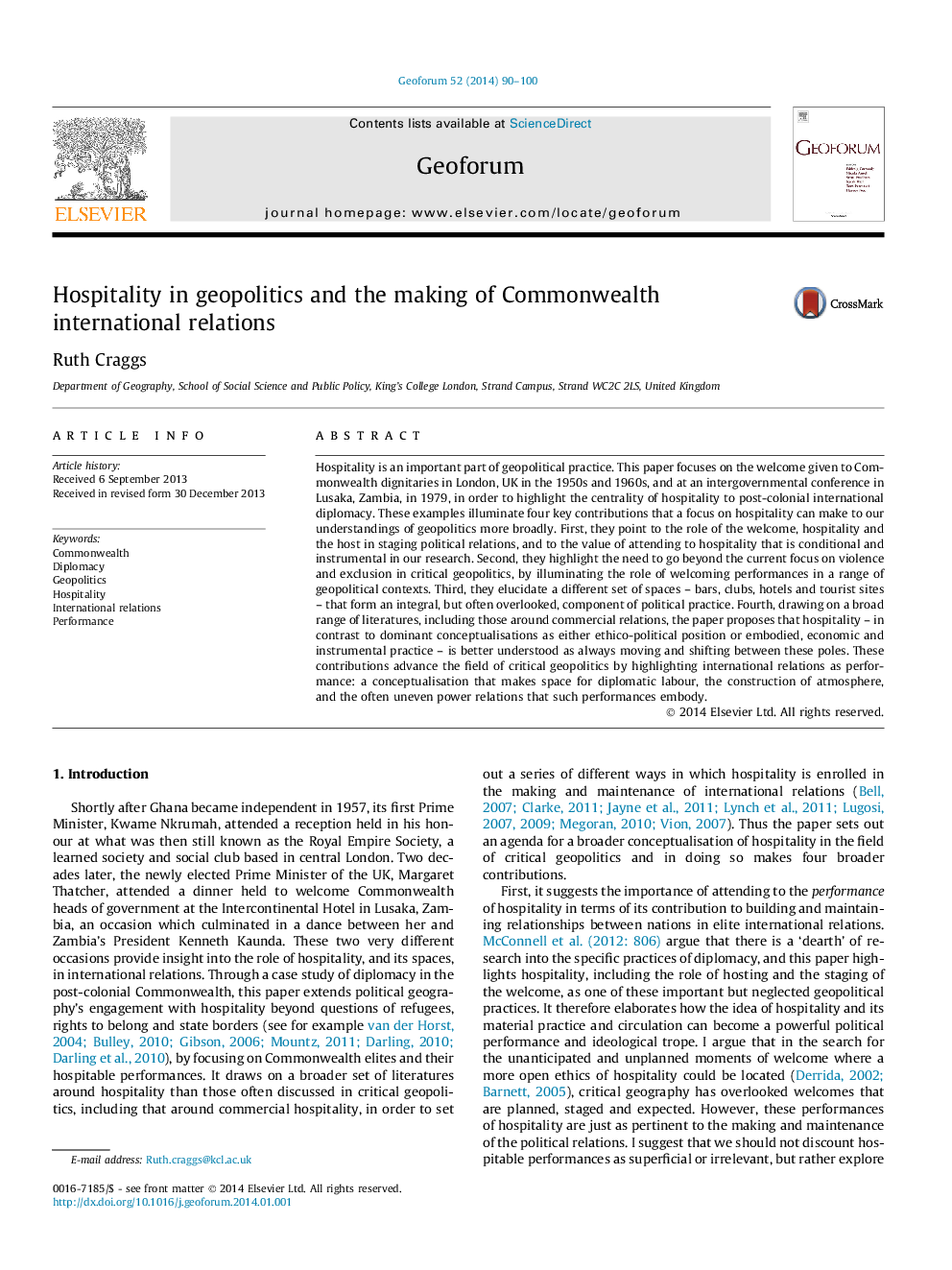| کد مقاله | کد نشریه | سال انتشار | مقاله انگلیسی | نسخه تمام متن |
|---|---|---|---|---|
| 5074072 | 1477137 | 2014 | 11 صفحه PDF | دانلود رایگان |
عنوان انگلیسی مقاله ISI
Hospitality in geopolitics and the making of Commonwealth international relations
ترجمه فارسی عنوان
مهمان نوازی در ژئوپولیتیک و ایجاد روابط بین المللی کشورهای مشترک المنافع
دانلود مقاله + سفارش ترجمه
دانلود مقاله ISI انگلیسی
رایگان برای ایرانیان
کلمات کلیدی
مشترک المنافع، دیپلماسی، ژئوپلیتیک، مهمان نوازی، روابط بین المللی، کارایی،
ترجمه چکیده
مهمانداری بخش مهمی از عمل جغرافیایی است. این مقاله بر روی خوش آمد به مقامات کشورهای مشترک المنافع در لندن، انگلستان در دهه 1950 و 1960 و در کنفرانس بین دولتی در لوساکا، زامبیا در سال 1979، به منظور برجسته بودن مهمان نوازی به دیپلماسی بین المللی پسا استعماری برجسته است. این نمونه ها چهار مشارکت کلیدی را برجسته می کند که تمرکز بر مهمان نوازی می تواند به درک ما از ژئوپلیتیک بیشتر درک شود. اول، آنها به نقش پذیرایی، مهمان نوازی و میزبان در رویکرد روابط سیاسی و ارزش شرکت در مهمان نوازی اشاره دارند که در پژوهش ما شرطی و سازنده است. دوم، آنها بر ضرورت فراتر از تمرکز کنونی بر خشونت و محرومیت در ژئوپولیتیک انتقادی، با تأکید بر نقش اجرای استقبال در طیف وسیعی از زمینه های ژئوپلیتیک، برجسته می شوند. سوم، آنها مجموعه ای متفاوت از فضاها - بارها، باشگاه ها، هتل ها و سایت های توریستی - را تشکیل می دهند که یک جزء متمایز از عمل سیاسی است اما اغلب نادیده گرفته می شوند. چهارم، با توجه به گستره وسیعی از ادبیات، از جمله آنهایی که در رابطه با روابط تجارتی هستند، این مقاله پیشنهاد می کند که مهمان نوازی - در مقایسه با مفهوم سازی غالب به مثابه موقعیت اخلاقی - سیاسی یا تجسم، عمل اقتصادی و سازمانی - بهتر درک می شود که همیشه در حال حرکت و تغییر بین این قطب ها. این مشاغل زمینه ژئوپولیتیک انتقادی را با برجسته کردن روابط بین الملل به عنوان عملکرد پیشرفت می کند: مفهومی که باعث ایجاد فضای کار دیپلماتیک، ساخت فضا و روابط قدرتمندی غالبا ناهموار می شود.
موضوعات مرتبط
علوم انسانی و اجتماعی
اقتصاد، اقتصادسنجی و امور مالی
اقتصاد و اقتصادسنجی
چکیده انگلیسی
Hospitality is an important part of geopolitical practice. This paper focuses on the welcome given to Commonwealth dignitaries in London, UK in the 1950s and 1960s, and at an intergovernmental conference in Lusaka, Zambia, in 1979, in order to highlight the centrality of hospitality to post-colonial international diplomacy. These examples illuminate four key contributions that a focus on hospitality can make to our understandings of geopolitics more broadly. First, they point to the role of the welcome, hospitality and the host in staging political relations, and to the value of attending to hospitality that is conditional and instrumental in our research. Second, they highlight the need to go beyond the current focus on violence and exclusion in critical geopolitics, by illuminating the role of welcoming performances in a range of geopolitical contexts. Third, they elucidate a different set of spaces - bars, clubs, hotels and tourist sites - that form an integral, but often overlooked, component of political practice. Fourth, drawing on a broad range of literatures, including those around commercial relations, the paper proposes that hospitality - in contrast to dominant conceptualisations as either ethico-political position or embodied, economic and instrumental practice - is better understood as always moving and shifting between these poles. These contributions advance the field of critical geopolitics by highlighting international relations as performance: a conceptualisation that makes space for diplomatic labour, the construction of atmosphere, and the often uneven power relations that such performances embody.
ناشر
Database: Elsevier - ScienceDirect (ساینس دایرکت)
Journal: Geoforum - Volume 52, March 2014, Pages 90-100
Journal: Geoforum - Volume 52, March 2014, Pages 90-100
نویسندگان
Ruth Craggs,
